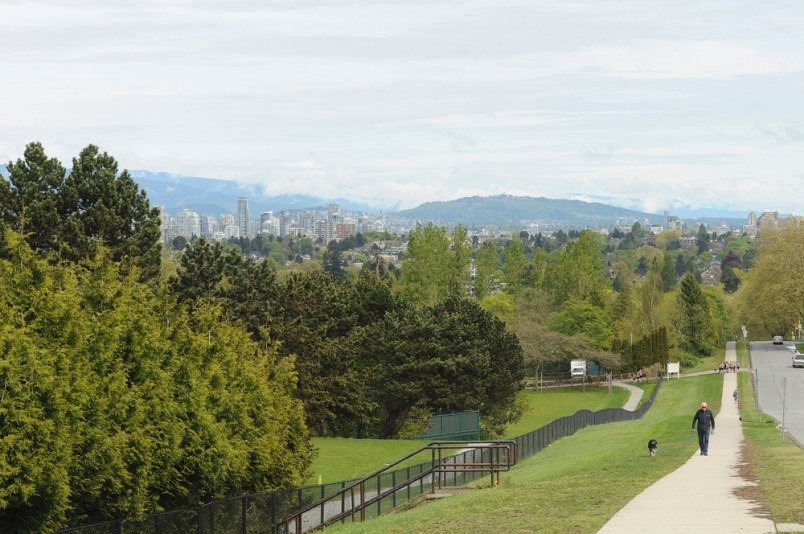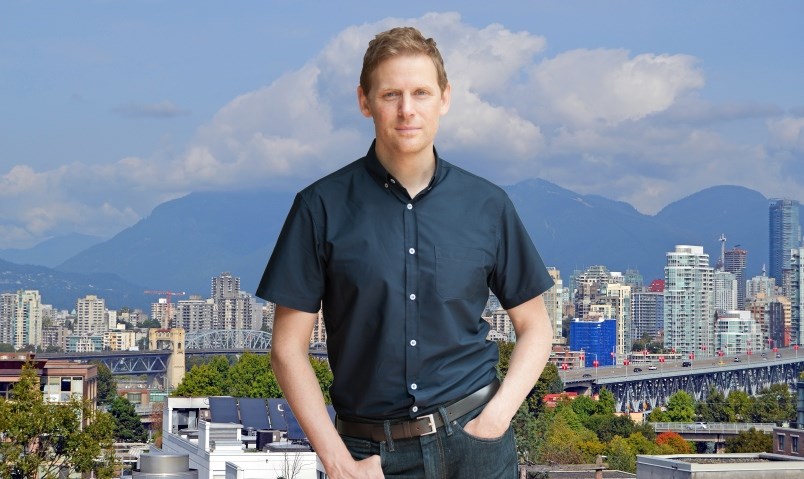Charles Montgomery, who wrote the book Happy City: Transforming Our Lives Through Urban Design, will be the first speaker in a series called “Inspire Jericho.” The series is co-hosted by the City of Vancouver along with the Musqueam, Squamish and Tsleil-Waututh partnership and Canada Lands Company, which are developing the 90-acre Jericho Lands, as part of the planning program for the project.
Montgomery rents in East Vancouver with roommates but plans to move into the Little Mountain co-housing complex when it's completed. We spoke to him about his thoughts on happy cities and communities.
Tell me briefly about who you are and what Happy City is.
Happy City is a book, it’s also a movement and, in particular, it’s an urban design and policy consultancy. My team and I work with cities around the world from Denver to Dubai to build happier, healthier, more inclusive places.
What’s the focus of your upcoming Inspire Jericho talk?
I want to share evidence and inspiration from around the world about the connection between community design and human happiness.
Is there a magic formula for a well-designed, ideal, happy community?
The central truth we’ve discovered through our research and practice is this: the happier city, or the happier community — the community that’s inclusive and healthy and walkable and connected — also happens to be exactly the kind of place we need to build and live in if we want to tackle the environmental crisis of our age, which is climate change. A happy community is one that nurtures psychological well-being and subjective well-being (happiness in the moment), and a long, happy life for all. It seems pretty basic but we’ve been building places for years, particularly on the edges of big North American cities, that basically do the opposite — that make us more disconnected, unhealthy and unhappy, and that shorten our lives.
Are there specific features in terms of height, density, and things like park spaces, that make happy cities?
Rather than first talk about specific designs, we think it’s first important to talk about our values and also the kinds of physical and emotional states we want to nurture. Guess what? It turns out the condition that’s most strongly correlated with happiness in Canadian cities is a condition of high social trust. If we want to build happier communities, the first thing we think about is creating places that nurture strong, positive social relationships. I know many Courier readers want to know whether towers are good or evil, whether density is good or bad, because this is often people’s prime concern. But we invite people to take a breath before condemning one form or another and think about what really matters, which is not how things look, but is the quality of everyday experience.
The evidence suggests that a happy community is a place where it’s safe, comfortable and fun to walk around. A place where you can meet most of your daily needs in a short, comfortable walking distance, a place where you see people you know — not from the window of your car, but face-to-face on the sidewalk or in a park. That may sound a little esoteric but, actually, when people feel like they belong in a community, it’s good for people’s health, it’s good for community resilience and it’s actually good for the economy. If people feel they belong, they generate more economic activity.

Do you think Vancouver is a happy city?
It depends what your baseline is. Compared to most cities in the world, Vancouver is pretty happy. Compared to other Canadian cities, Vancouver is under-performing. For the most part, Canada’s smaller cites beat Canada’s big, rich cities. It’s no surprise that those smaller cities that win on happiness are also reporting the highest levels of social trust. We know we have a crisis of affordability in Vancouver but we also have a crisis of social disconnection. If we build better communities, we can tackle both of those crises at the same time.
Can you really tackle affordability? A lot of people in Vancouver think that’s hopeless and that the train has already left the station — no matter how you develop or design Vancouver or how many bikes paths there are or how dense it is — it’s not being built for people to afford it.
I’m not speaking specifically about the Jericho site. I’m speaking generally here. We’ve learned a hard lesson in Vancouver over the last 20 years. The lesson is that if we only focus on design, then we will fail on social inclusion, happiness and resilience. We need to use everything in our toolbox to ensure the future Vancouver is not just a place where everybody wants to be, but it’s a place where people can live, work and study in. This means going beyond design and using tools — like the tools the government has been introducing such as the speculation tax and the empty homes tax, and incentivising rental property development — and we need to supersize our [Vancouver] Affordable Housing Agency and our Community Land Trust so that we build more non-market housing.
What can happiness look like on a site the size of the Jericho Lands?
We’ve been studying urban experiments in cities around the world and my favourite place is a suburb of Freiburg, Germany, called Vauban. This remarkable community mixes housing for students, subsidized housing and market housing all together in the most-walkable community I’ve ever been to. What’s the secret in Vauban? It’s the kind of place where a five-year-old can still walk or bike to school by herself without fear. They’ve made the decision to stop privileging private automobiles.
If you move to Vauban and you have a car, you purchase a parking spot in a garage at the edge of the village. If you move to Vauban and you don’t have a car, you save a lot of money. This innovation actually makes everyone’s life better, including car owners because now everybody in Vauban begins their day with a two- to five-minute walk and they meet each other on the streets. Their children are safe on the streets. Their day begins in a healthy and social way and it’s a wonderful place to be. A place like Vauban can show us the way.
What would you say is the lasting message you hope to impart during your April 17 talk? What do you want people to think about as they consider the upcoming development of the Jericho Lands?
Our core message is a happy community and a healthy community and a low-carbon community are the very same place. In the age of climate change, we have a moral responsibility to live closer together and to drive less.
Also, I think there’s another question that many Vancouverites need to ask ourselves when we think about the Jericho Lands. It’s this — our local First Nations have watched for many decades as settlers on this land have prospered, and may even have gotten rich, on what was essentially stolen land. In an age of reconciliation, how can all of us now support the Musqueam, Squamish and Tsleil-Waututh’s efforts to put this land to the best use and create income to benefit their communities?
Montgomery’s talk about how to build healthy, happy communities, runs from 7 to 9:15 p.m. at Kitsilano secondary school, April 17. Registration, which is free, is required to attend the event. Details can be found here. More talks are being planned for coming months. Feedback will be collected, which will help inform the policy statement for the site. Read more about the Jericho Lands development here.
This story has been clarified since first posted.
@naoibh



